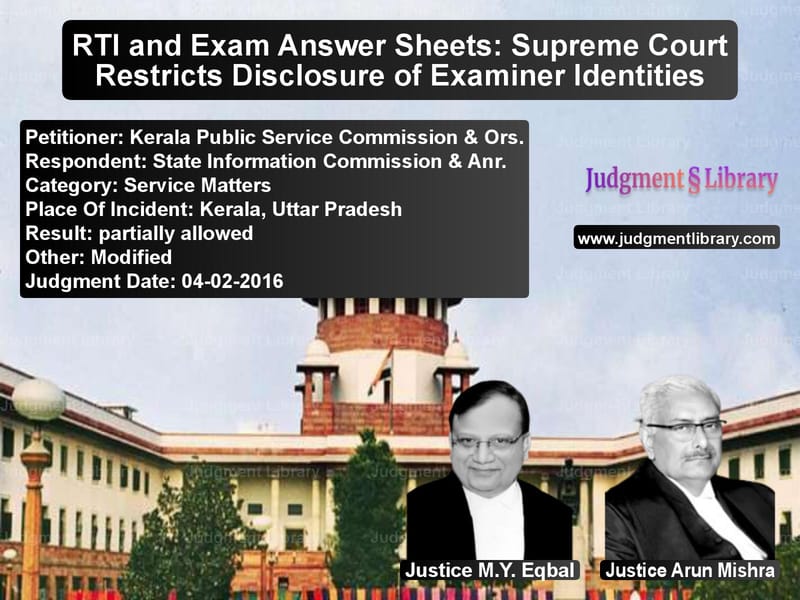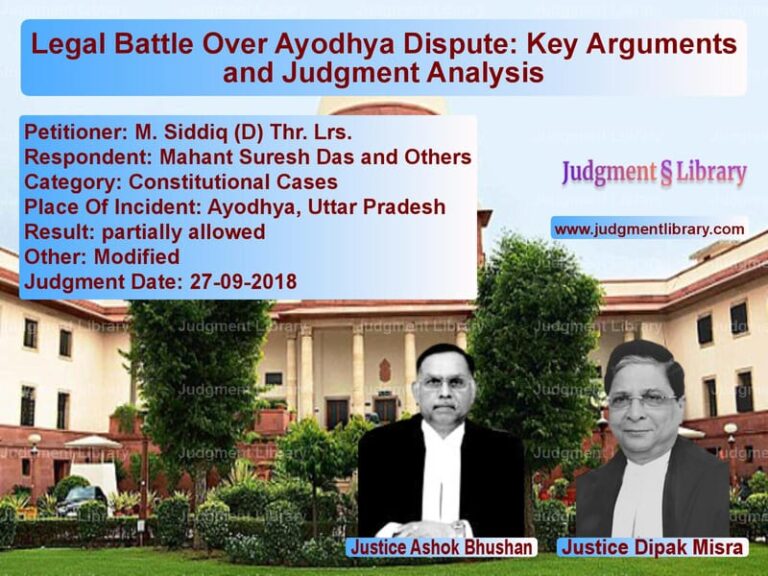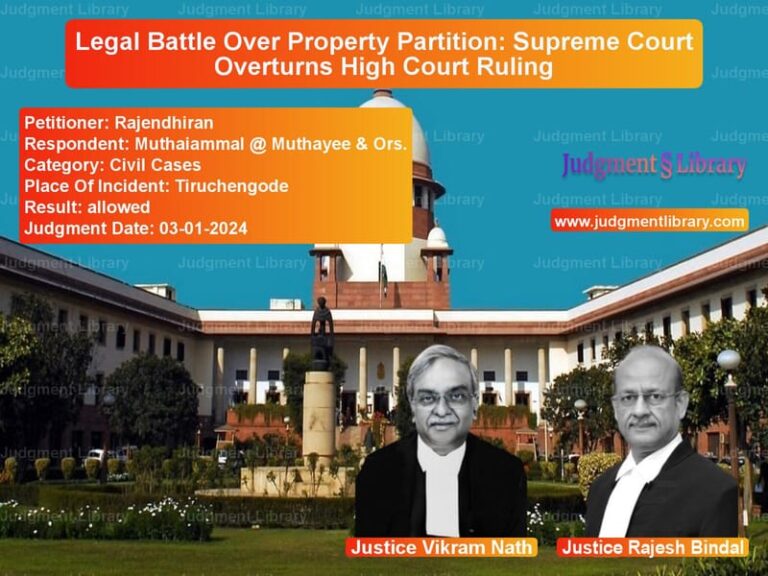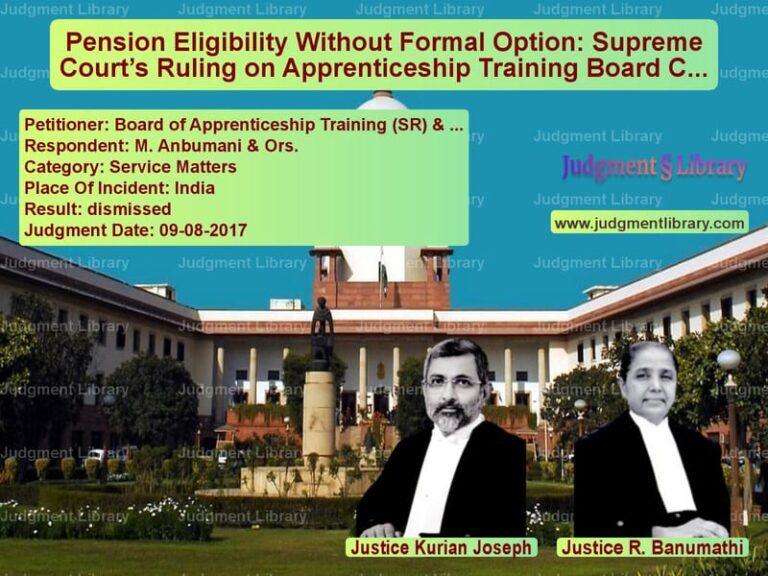RTI and Exam Answer Sheets: Supreme Court Restricts Disclosure of Examiner Identities
The case of Kerala Public Service Commission & Ors. vs. State Information Commission & Anr. deals with the Right to Information (RTI) Act, particularly concerning the disclosure of scanned answer sheets, interview marks, and the identities of examiners in recruitment examinations. The Supreme Court ruled on whether such disclosures were justified under the RTI Act, balancing the right to information with the need to maintain confidentiality in the examination process.
Background of the Case
The appeals arose from separate decisions of the Kerala High Court and Allahabad High Court regarding requests made under the Right to Information Act, 2005. Candidates who had appeared for exams conducted by the Kerala Public Service Commission (KPSC) and Uttar Pradesh Public Service Commission (UPPSC) sought information about:
- Scanned copies of their answer sheets.
- Tabulation sheets containing interview marks.
- Names of the examiners who evaluated their answer sheets.
The Public Service Commissions (PSCs) initially denied these requests, citing exemptions under the RTI Act. The candidates approached the State Information Commissions, which ruled in their favor. The High Courts also upheld the decisions, leading the PSCs to appeal to the Supreme Court.
Key Issues Before the Supreme Court
- Whether scanned copies of answer sheets and interview marks could be disclosed under the RTI Act.
- Whether the names of examiners who evaluated answer sheets should be disclosed.
- Whether the PSCs had a fiduciary relationship with the examiners, exempting them from disclosure under Section 8(1)(e) of the RTI Act.
Petitioners’ (Public Service Commissions) Arguments
- The disclosure of answer sheets and interview marks could be permitted, but revealing the names of examiners would create security concerns.
- There exists a fiduciary relationship between the PSCs and examiners, exempting the latter’s identities from disclosure under Section 8(1)(e) of the RTI Act.
- Publishing examiners’ identities could expose them to harassment, threats, and undue influence, jeopardizing the integrity of recruitment processes.
Respondents’ (Candidates Seeking Information) Arguments
- The RTI Act promotes transparency, and PSCs should not withhold information that affects candidates’ careers.
- There is no fiduciary relationship between examiners and PSCs since the examiners are appointed for a limited task.
- Disclosing examiners’ identities would ensure accountability and prevent malpractices in the examination system.
Supreme Court’s Judgment
On February 4, 2016, the Supreme Court, comprising Justice M.Y. Eqbal and Justice Arun Mishra, ruled that:
- Candidates are entitled to receive scanned copies of their answer sheets and interview marks.
- The PSCs must disclose answer sheets and interview marks upon request under the RTI Act.
- However, the PSCs are not required to disclose the names of the examiners who evaluated answer sheets.
Key Observations by the Supreme Court
- The examiners work in a principal-agent relationship with the PSCs. Examiners evaluate papers based on instructions given by the PSCs, making their role fiduciary in nature.
- Disclosing examiners’ identities could lead to public unrest, with unsuccessful candidates potentially taking revenge against them.
- Publishing the names of examiners could encourage malpractices in future examinations, as candidates might try to influence them.
- Transparency in recruitment can be ensured by disclosing answer sheets and interview marks without revealing examiners’ identities.
The Court ruled:
“The request of the information seeker about the details of the person who had examined/checked the paper cannot and shall not be provided as the relationship between the Public Service Commission and the Examiners is totally within fiduciary relationship.”
The Court modified the Kerala High Court’s ruling to the extent that examiner identities should not be disclosed, while upholding other aspects of the decision.
Key Legal Takeaways
- Transparency in Competitive Exams: Candidates have the right to access their answer sheets and interview marks.
- Fiduciary Relationship: PSCs have a fiduciary relationship with examiners, exempting their identities from disclosure.
- Protection of Examiners: Shielding examiners’ names prevents potential intimidation or undue influence.
- Balancing RTI with Confidentiality: The ruling establishes a balance between transparency and maintaining examination integrity.
Conclusion
The Supreme Court’s ruling affirms the right of candidates to access their evaluated answer sheets while protecting the identities of examiners. The judgment ensures fairness in public service recruitment without compromising the security of examiners. This precedent reinforces the need to balance transparency with confidentiality in examination processes under the RTI Act.
Don’t miss out on the full details! Download the complete judgment in PDF format below and gain valuable insights instantly!
Download Judgment: Kerala Public Servic vs State Information Co Supreme Court of India Judgment Dated 04-02-2016-1741852470754.pdf
Direct Downlaod Judgment: Direct downlaod this Judgment
See all petitions in Recruitment Policies
See all petitions in Public Sector Employees
See all petitions in Employment Disputes
See all petitions in Judgment by M.Y. Eqbal
See all petitions in Judgment by Arun Mishra
See all petitions in partially allowed
See all petitions in Modified
See all petitions in supreme court of India judgments February 2016
See all petitions in 2016 judgments
See all posts in Service Matters Category
See all allowed petitions in Service Matters Category
See all Dismissed petitions in Service Matters Category
See all partially allowed petitions in Service Matters Category







